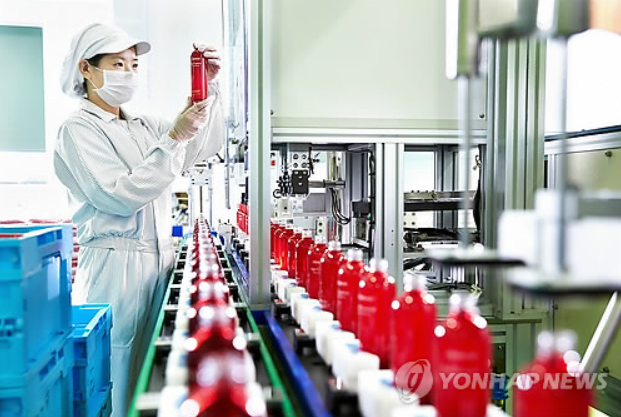- California Assembly OKs highest minimum wage in nation
- S. Korea unveils first graphic cigarette warnings
- US joins with South Korea, Japan in bid to deter North Korea
- LPGA golfer Chun In-gee finally back in action
- S. Korea won’t be top seed in final World Cup qualification round
- US men’s soccer misses 2nd straight Olympics
- US back on track in qualifying with 4-0 win over Guatemala
- High-intensity workout injuries spawn cottage industry
- CDC expands range of Zika mosquitoes into parts of Northeast
- Who knew? ‘The Walking Dead’ is helping families connect
Size of S. Korea’s economy to catch up to Japan’s by 2020

An employee at Amore Pacific, a South Korean cosmetic maker, examines a sample at a factory. (Yonhap)
By Yoon Ja-young
Korea’s per capita gross domestic product (GDP) is expected to near $37,000 in five years, catching up to Japan.
The report comes from estimates by the International Monetary Fund (IMF) World Economic Outlook Database, but experts point out that it would be difficult for ordinary people to feel as if they are better off unless their quality of life improves.
According to the estimates, Korea’s nominal per capita GDP will likely reach $36,750 in 2020, up 31.4 percent from last year’s $27,970.
Japan, meanwhile, will see its per capita GDP grow a mere 6 percent to $38,174 from $36,222 in the same period.
It compares with a decade ago when Japan’s per capita GDP was double that of Korea: Japan’s per capita GDP was $35,785 in 2005, while that of Korea stood at a mere $18,658.
On top of the narrowing gap in per capita income, the Swiss-based International Institute for Management Development (IMD) evaluated Korea as more competitive than Japan in its World Competitiveness report, ranking Korea 25th, two notches higher than Japan.
However, not many Koreans seem to think that they will be as well off as the Japanese in five years.
“They say they would have no problem living with only part-time income in Japan. In Korea, even those with regular jobs can barely make ends meet,” said Park Jun-ho, an office worker in Gyeonggi Province.
Park Jong-kyu, a senior research fellow at the Korea Institute of Finance, said that if such estimates become reality, it would be mostly due to a favorable foreign exchange rate.
“It could happen if the Korean won continues to get stronger and the Japanese yen continues to get weaker. Without the favorable foreign exchange rate, it would be difficult to narrow the gap in only five years.”
As the estimates are affected by the foreign exchange rate, he said it would be difficult for ordinary citizens to feel Korea’s prosperity, except for Koreans who often travel or live abroad.
While he agreed that the per capita GDP is the most comprehensive evaluation of a country’s economy, he stressed that it isn’t necessarily how the people of the country would evaluate their economic conditions. He took Japan as an example, where per capita GDP surpassed $40,000 in 1995, thanks to the strong Japanese yen, even though the country had entered the so-called lost decade.
The fair distribution of income also matters. If the wealth of a country is concentrated only with a few, the majority of the people wouldn’t feel they are rich even if the per capita GDP has risen. “The income distribution has worsened in Korea during the past few years. It is more evenly distributed in Japan,” Park said.
Last year, the Hyundai Research Institute released a report that expects Korea will surpass Japan in 2016 thanks to higher economic growth, but it pointed out that the quality of life is poorer in Korea.
“According to the Better Life Index by the Organization for Economic Cooperation and Development (OECD), Korea ranked lower than Japan in sectors such as jobs, community, environment, leisure as well as evaluation of income based on assets and disposable income,” said Choi Seong-keun, a senior researcher at the institute.
He said that the country should make greater efforts to improve the quality of life in addition to securing economic growth.












![일본 사도광산 [서경덕 교수 제공. 재판매 및 DB 금지]](http://www.koreatimesus.com/wp-content/uploads/2024/07/PYH2024072610800050400_P4-copy-120x134.jpg)



Pingback: Comprehensive Survey Living Conditions Japan | stsrt -mini survey cash
Pingback: Electrician Part Time Job Japan | electrical supply
Pingback: Electrician Part Time Job Japan | electrician tools
Pingback: Electrician Part Time Job Japan | solutions - emergency electrician
Pingback: Economic Survey Of Korea Oecd | research - market research survey